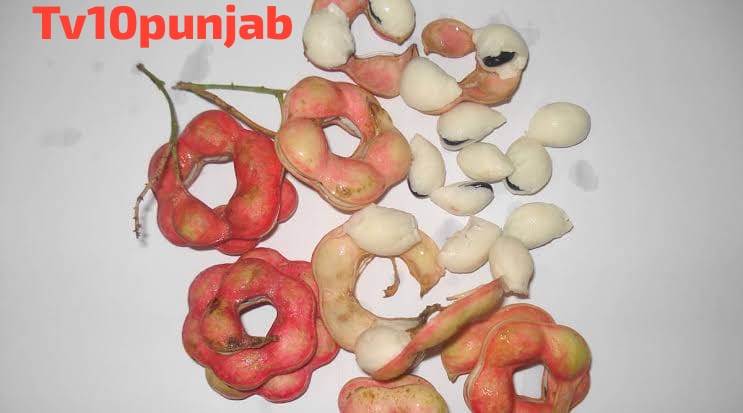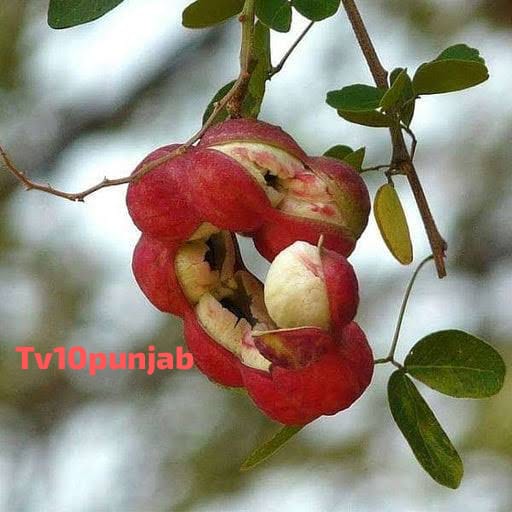Health Desk
Tv10punjab
Sandeep Dhand
Nutritionist & Health Educator
Introduction
Nature has gifted us many amazing fruits that not only taste delicious but also provide health benefits. One such fruit is Jungle Jalebi, also known as Madras Thorn, Manila Tamarind, Kodukkapuli, and Vilayati Imli. Its scientific name is Pithecellobium dulce. This fruit is less popular compared to mangoes, bananas, or guavas, but it is full of nutrition and can help in managing many health problems.
In Punjab and other parts of India, this tree is seen in parks, roadside areas, and sometimes in home gardens. The pods of this tree contain white or pinkish pulp which tastes sweet and slightly tangy. Children especially love eating it because of its unique flavor and jelly-like texture.

This article will give you complete information about Jungle Jalebi, its nutritional value, medicinal benefits, diseases where it is helpful, and other important details.
Different Names of Jungle Jalebi
Jungle Jalebi is known by many names in different regions and languages:
English: Madras Thorn, Manila Tamarind
Hindi: Jungle Jalebi, Vilayati Imli
Punjabi: Jungle Jalebi, Vilayati Imli
Tamil: Kodukkapuli
Telugu: Seema Chintakaya
Malayalam: Kodukapuli
Marathi: Vilayati Chinch
Gujarati: Jangal Jalebi
Kannada: Seeme Hunase
These different names show how popular the tree is across India and other tropical countries.
Physical Description of the Tree and Fruit
- Tree:
Grows up to 10–15 meters tall.
Has thorny branches.
Provides thick shade, which is why it is often planted roadside.
- Leaves:
Small, green, and compound.
Provides cooling shade during hot weather.
- Flowers:
Small, white, and fragrant.
Attracts bees and helps in pollination.
- Fruit (Pod):
Brown and curly like tamarind pods.
When opened, it reveals white or pink pulp.
Inside the pulp are shiny black seeds.
The pulp is edible, juicy, sweet, and tangy in taste.
Nutritional Value of Jungle Jalebi
Jungle Jalebi pulp is low in calories but rich in important nutrients. Approximate nutritional value per 100 grams (fresh pulp):
Calories: 90–100 kcal
Carbohydrates: 20–22 g
Protein: 2–3 g
Fat: 0.5–1 g
Dietary Fiber: 5–6 g
Vitamin C: 35–40 mg (good immunity booster)
Calcium: 40–50 mg (for strong bones)
Iron: 1.5–2 mg (for healthy blood)
Potassium: 250–300 mg (for heart health)
Magnesium: 20–25 mg
Antioxidants: High (polyphenols, flavonoids)
This shows that Jungle Jalebi is not just tasty, but also highly nutritious and helpful for daily health needs.
Health Benefits of Jungle Jalebi
- Boosts Immunity
The fruit is rich in Vitamin C and antioxidants which strengthen the immune system. Eating Jungle Jalebi can protect the body from common infections like cold, cough, and seasonal flu.
- Good for Digestion

The high fiber content improves digestion, prevents constipation, and cleans the stomach naturally. It also promotes good gut bacteria.
- Manages Diabetes
Although it is sweet in taste, Jungle Jalebi has a low glycemic index. It helps in controlling blood sugar levels when eaten in moderation. Studies suggest that the seeds and leaves also have anti-diabetic properties.
- Improves Heart Health
The potassium and antioxidants in the fruit help in maintaining blood pressure, reduce cholesterol levels, and prevent heart diseases.
- Helps in Weight Loss
Since it is low in calories and high in fiber, it makes you feel full for a long time and prevents overeating. This can help in weight management.
- Strengthens Bones and Teeth
Calcium and phosphorus present in Jungle Jalebi make bones strong and prevent diseases like osteoporosis. It is also good for dental health.
- Improves Skin Health
Vitamin C and antioxidants help in removing toxins from the body, making the skin glowing, fresh, and wrinkle-free.
- Boosts Energy Levels
The natural sugars in Jungle Jalebi provide instant energy, making it a good fruit for children, students, and athletes.
- Treats Anemia
Since it contains iron, it helps in increasing hemoglobin levels and prevents anemia.
- Anti-inflammatory Properties
The pulp and seeds have anti-inflammatory compounds which reduce swelling, joint pain, and arthritis symptoms.
Jungle Jalebi and Diseases
Jungle Jalebi is useful in managing or preventing the following diseases:
- Diabetes – helps in blood sugar control.
- Constipation and Digestive Problems – due to its fiber content.
- Heart Diseases & High Blood Pressure – potassium and antioxidants improve heart health.
- Anemia – iron content helps in hemoglobin production.
- Arthritis & Joint Pain – reduces inflammation.
- Skin Problems – vitamin C and antioxidants heal acne, pimples, and dull skin.
- Weak Immunity – protects against infections.
- Obesity – supports weight loss.
- Bone Weakness (Osteoporosis) – calcium-rich.
- Fatigue & Weakness – provides natural energy.
How to Eat Jungle Jalebi
Raw fruit pulp: Eat directly after removing the seeds.
Juice: The pulp can be blended into a refreshing drink.
Chutney: In some regions, Jungle Jalebi pulp is used to make tangy chutneys.
Pickle: Pods are sometimes used in pickling.
Medicinal uses: Seeds and leaves are also used in traditional Ayurvedic medicine.
Jungle Jalebi in Ayurveda and Folk Medicine
In Ayurveda, Jungle Jalebi has been used for many years:
Leaves: Used to treat mouth ulcers and skin problems.
Seeds: Known to have anti-diabetic properties.
Bark: Used for treating diarrhea and stomach problems.
It is considered a cooling fruit, good for balancing body heat in summer.
Jungle Jalebi in Punjab and India
In Punjab, Jungle Jalebi trees are not as common as mango or guava trees, but they can still be seen in some villages, parks, and roadside plantations. The fruit ripens in the summer season and children especially enjoy eating it.
In other states like Uttar Pradesh, Rajasthan, Tamil Nadu, and Maharashtra, the fruit is more popular and sometimes even sold in local markets.
Side Effects and Precautions
Eating too much pulp can cause stomach upset in sensitive people.
The seeds are not edible in raw form; they may be toxic.
Diabetic patients should eat in moderation and monitor sugar levels.
Pregnant women should consult a doctor before consuming in large amounts.
Conclusion
Jungle Jalebi (Pithecellobium dulce) is a unique, tasty, and nutritious fruit that is often underestimated. Its sweet and tangy flavor makes it popular among children, while its nutritional richness makes it valuable for health. From improving immunity and digestion to protecting the heart and bones, Jungle Jalebi is a true natural gift.
Although it is not as widely available in Punjab as in other parts of India, planting this tree in gardens and farmlands can provide shade, beauty, and nutritious fruits for the family.
By including Jungle Jalebi in your diet in moderation, you can enjoy both its taste and health benefits.




